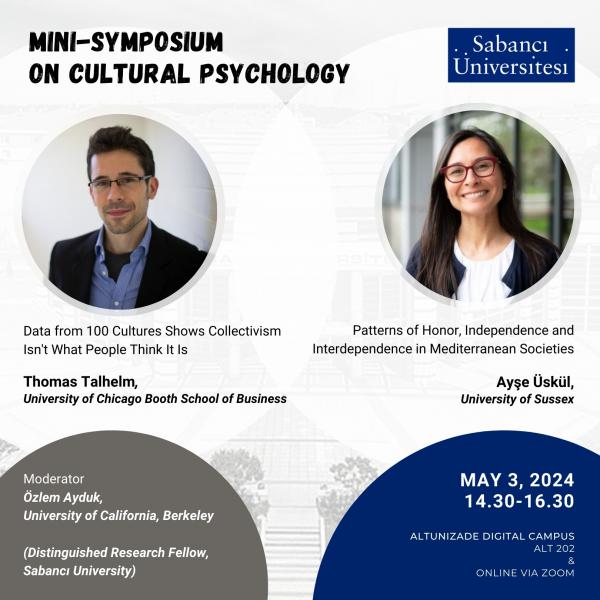Mini Symposium on Cultural Psychology
Mini Symposium on Cultural Psychology
Please join the Sabanci University Faculty of Arts and Social Sciences for our mini symposium on cultural psychology.
Time: Friday, May 3, 2024, 2:30 pm - 4:30 pm Istanbul time
(The speakers will be in the venue to answer questions and chat till around 5:00 pm.)
Place: Sabanci Digital Campus, Altunizade, Istanbul (Room ALT 202) or Online (Zoom Webinar)
Speakers:
Thomas Talhelm, Associate Professor of Behavioral Science, University of Chicago Booth School of Business
Title: "Data from 100 Cultures Shows Collectivism Isn't What People Think It Is"
Ayşe Üskül, Professor of Psychology, University of Sussex
Title: "Patterns of Honor, Independence and Interdependence in Mediterranean Societies"
Moderator:
Ozlem Ayduk, Professor of Psychology at the University of California, Berkeley and Distinguished Fellow at Sabanci University
The event is open to the public free of charge. You may register by following this link: https://sabancimanagement.qualtrics.com/jfe/form/SV_0GlcE71qRya2GFM
Abstracts and speaker bios can be found below.
Speaker: Thomas Talhelm, PhD
Title: Data from 100 Cultures Shows Collectivism Isn't What People Think It Is
Abstract:
When I started as a research assistant 20 years ago, insiders let me in on an open secret: self-report scales of collectivism "don't work." Here’s an example of what they meant. The US regularly scores more collectivistic than Japan (Oyserman et al., 2002). A meta-analysis found that East-West differences were no different from flipping a coin (Heine, 2002). Sure sounds like a problem! The field responded. Papers were published. Most responses blamed self-report methodology. In this talk, I’ll offer the explanation that we were measuring the wrong idea of collectivism. If we measure the right idea of collectivism, we can measure cultural differences in collectivism reliably. I’ll share data testing this idea with 16,237 people from 100 cultures around the world.
Short Bio:
Thomas Talhelm is an Associate Professor of Behavioral Science at the University of Chicago Booth School of Business. Thomas has lived in China for seven years as a Princeton in Asia fellow, as a freelance journalist, and a Fulbright scholar. He researches how rice farming gave southern China a different culture from wheat-farming northern China. While in China, he founded Smart Air, a social enterprise that makes low-cost DIY air purifiers to help people in China and India protect themselves from air pollution.
Speaker: Ayşe Üskül, PhD
Title: Patterns of Honor, Independence and Interdependence in Mediterranean Societies
Abstract:
In this talk I will present recent findings pointing to a distinct emphasis on several forms of independent and interdependent social orientation, cognitive style, and self-construal in the Mediterranean region compared to more commonly studied East Asian and Anglo-Western cultural groups. I will also share results on the prevalence of honour (as well as face and dignity) values in this region and how they account for some of the regional differences observed in social orientation and cognitive style indicators. These findings extend previous insights into patterns of cultural orientation beyond commonly examined East–West comparisons to an understudied world region and help us conclude that cultural logic of honor plays a role in Mediterranean societies, but labelling these societies as “honor cultures” is oversimplistic.
Short bio:
Üskül is a social and cultural psychologist interested in the role of cultural and socio-ecological context in self-related, interpersonal and social cognitive processes. She completed her degrees at Bogazici University in Istanbul, Turkey (BA), Vrije Universiteit, Amsterdam, the Netherlands (MA), and York University, Toronto, Canada (PhD) and held a SSHRC-funded Postdoctoral Fellowship at the University of Michigan, Ann Arbor (USA). She held academic positions at the University of Essex, Queen's University Belfast, and University of Kent before joining the University of Sussex in 2022. Her past research on socio-economic basis of interdependence, cultural conceptions of honour, and culture and health behaviour change received funding from the British Academy, the US National Science Foundation, the Economic and Social Research Council, the Leverhulme Trust, and Japanese Society of the Promotion of Science, among others. Her current comparative research on the role of honour in social interactional processes is funded by a European Research Council Consolidator Grant (www.honorlogic.org). She is Co-Chief Editor of the European Review of Social Psychology and the President of the Psychology Section of the British Science Association. She was awarded Fellow status by the Association for Psychological Science, the Society for Experimental Social Psychology, and the Society for Personality and Social Psychology. In 2023, she was the recipient of the European Association of Social Psychology MidCareer Award and the Jenessa Shapiro Contributions to Diversity and Inclusion Award from the Society for Personality and Social Psychology.
